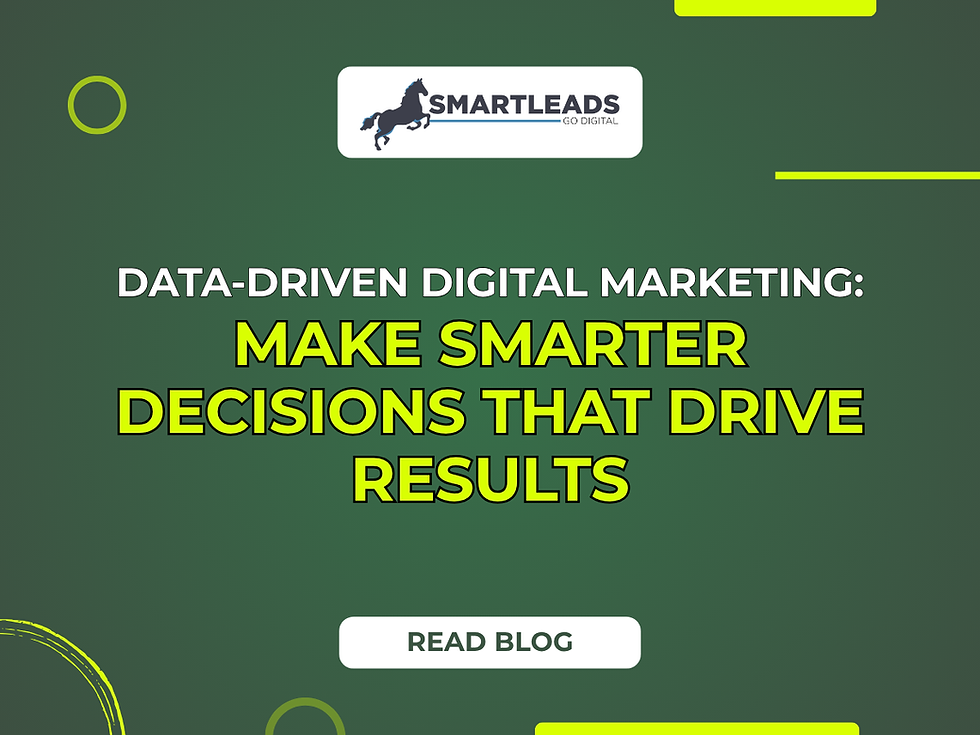Data-Driven Digital Marketing: Make Smarter Decisions That Drive Results
- smartleadsads
- Jun 3
- 3 min read

In today’s competitive digital landscape, success is no longer based on guesswork or intuition. Brands that win are those that leverage data-driven digital marketing to guide every strategy, campaign, and customer interaction. As 2025 unfolds, the digital marketing ecosystem is more intelligent, agile, and metrics-focused than ever.
At Smart Leads Digital, we believe that marketing powered by data delivers sharper insights, higher ROI, and consistent growth. This blog explores how data-driven strategies are transforming marketing and why businesses must adopt them to stay ahead.
What Is Data-Driven Digital Marketing?
Data-driven digital marketing is the strategic use of customer data, analytics, and performance metrics to optimize marketing decisions. It involves collecting and analyzing data from various sources—website analytics, social media platforms, email campaigns, CRMs, and more—to understand user behavior, segment audiences, predict trends, and personalize content.
Rather than relying on broad assumptions or “one-size-fits-all” messaging, data-driven marketing helps you connect with the right audience, at the right time, through the right channels.
Why Data-Driven Marketing Matters in 2025
The digital ecosystem is more crowded and fast-paced than ever. Consumers are bombarded with content daily, and only the most relevant messages break through the noise. Data helps brands cut through this clutter by tailoring their communication based on actual customer preferences, behaviors, and patterns.
With AI, machine learning, and predictive analytics becoming mainstream, marketers now have access to smarter tools that go beyond tracking past performance—they can anticipate future actions. At Smart Leads Digital, we equip businesses with the tools and strategies to interpret this data and act on it in real time.
Key Benefits of Data-Driven Digital Marketing
1. Precision Targeting
Using data, marketers can identify ideal customer profiles and segment them based on demographics, purchase behavior, interests, and engagement history. This leads to campaigns that are highly targeted and more likely to convert.
2. Improved ROI
By eliminating guesswork and focusing only on strategies that work, businesses can invest their budgets more effectively. Whether it’s paid ads, SEO, or email campaigns, data shows what drives the best return.
3. Real-Time Optimization
Data-driven campaigns aren’t static. They evolve based on live feedback and performance metrics. At Smart Leads Digital, we constantly monitor KPIs to optimize ad creatives, targeting, and channel performance in real-time.
4. Personalized Customer Experiences
Personalization is no longer a luxury—it's a necessity. Data allows brands to deliver personalized experiences across channels. From customized product recommendations to tailored email content, personalization boosts engagement and builds loyalty.
5. Informed Content Strategy
Which blog posts get the most views? What kind of social media content generates leads? Data tells you exactly what your audience wants. This helps shape your content strategy for maximum impact.
Data Sources Every Marketer Should Use
Google Analytics – for website traffic, conversion goals, user behavior, and acquisition insights.
Social Media Insights – Facebook, Instagram, LinkedIn, and X (Twitter) offer deep engagement analytics.
Email Marketing Platforms – tools like Mailchimp and HubSpot track open rates, click-throughs, and conversions.
CRM Systems – customer relationship management tools provide in-depth insights on customer lifecycle and sales.
Ad Platforms – Google Ads and Meta Ads dashboards provide granular ad performance data.
At Smart Leads Digital, we integrate all your marketing platforms into a unified analytics dashboard, so you can track and measure performance with clarity.
Common Pitfalls in Data-Driven Marketing
While data can be a game-changer, misinterpreting it can lead to poor decisions. Some common mistakes include:
Focusing on vanity metrics (likes, impressions) rather than actionable KPIs (conversions, CPA).
Ignoring customer feedback and only relying on numbers.
Not updating data sources or acting on outdated insights.
Overcomplicating data interpretation without a clear objective.
Smart data use requires a strategic mindset. Smart Leads Digital helps clients not just collect data but also extract actionable insights that align with business goals.
How to Get Started with Data-Driven Marketing
Define Your KPIs: Identify what success looks like for your business—more traffic, leads, sales, or retention.
Set Up Tracking: Ensure proper tracking systems are in place (Google Analytics, Facebook Pixel, etc.).
Collect and Analyze: Use tools to collect real-time data and analyze performance patterns.
Test and Optimize: Run A/B tests to refine messaging, design, and targeting.
Partner with Experts: Work with a digital marketing partner like Smart Leads Digital to make sense of the numbers and act strategically.
Final Thoughts
In 2025, data isn’t just an asset—it’s a necessity. Brands that embrace data-driven digital marketing are more responsive, more personalized, and more profitable. With the right strategy, tools, and expertise, your business can make smarter decisions that truly drive results.
Smart Leads Digital is your partner in building data-first marketing systems that scale. Ready to turn your data into growth? Contact us today to get started.




Comments